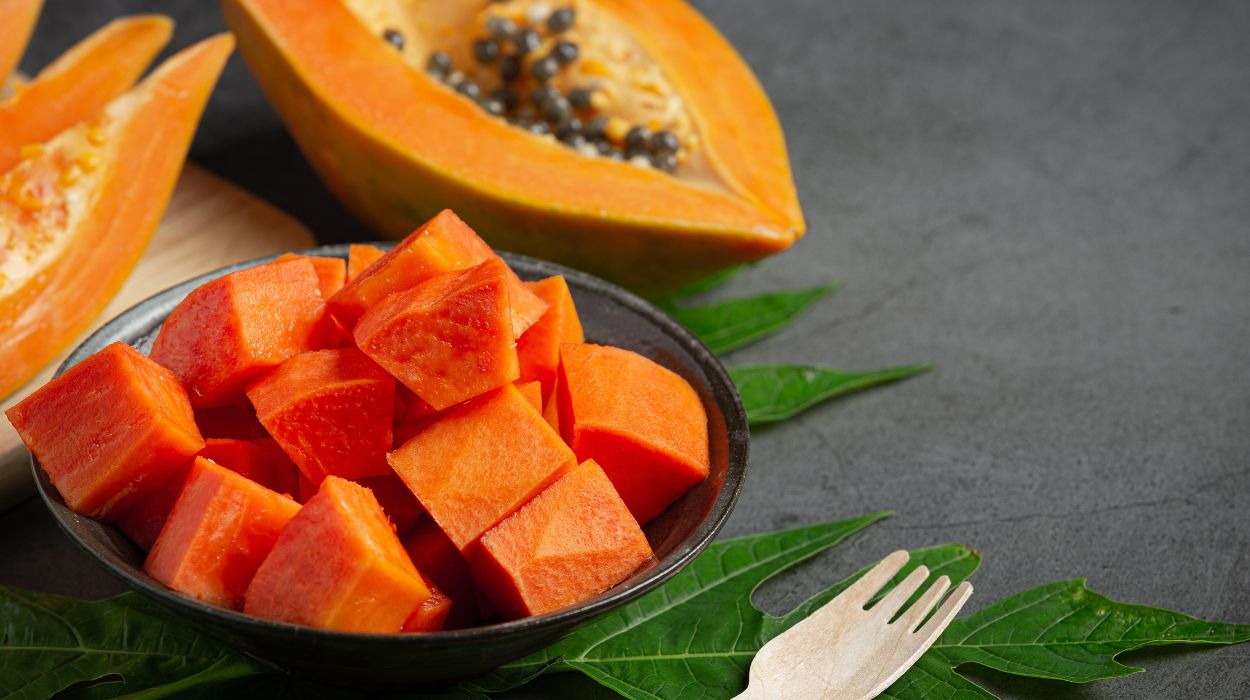 Expert's opinion
Expert's opinion
Expert's opinion
The article is a subjective view on this topic written by writers specializing in medical writing.
It may reflect on a personal journey surrounding struggles with an illness or medical condition, involve product comparisons, diet considerations, or other health-related opinions.
Although the view is entirely that of the writer, it is based on academic experiences and scientific research they have conducted; it is fact-checked by a team of degreed medical experts, and validated by sources attached to the article.
The numbers in parenthesis (1,2,3) will take you to clickable links to related scientific papers.
Papaya Benefits, Nutrition, Risks & How To Enjoy In 2024

Papaya benefits are abundant, including a reduced risk of high blood pressure, increased gut health, and anticancer properties. Additionally, eating papaya can help improve digestion and, if present, fight cancer and lower blood pressure; it can even aid hair health.
Even though papaya is considered a tropical fruit, it can now be found at most grocery stores throughout the year. The papaya is a soft fruit with multiple black seeds in the middle.
Most people tend to scoop out papaya seeds because of their bitter taste, even though they are edible. The meat of the papaya has a creamy texture closely related to a melon.
Health Benefits Of Papaya
The papaya benefits include reduced risk of high blood pressure, increased gut health, and anticancer properties. Read on to find out about these.
- Improve digestive health.
- Reduce cancer risk.
- Improve heart health.
- Support skin health.
- Benefits for women’s health.
- Benefits for men’s health.
- Promote hair health.
- Protect eye health.
- Blood disorders.
Impressive Papaya Benefits For Your Health
The papaya is an incredibly nutrient-rich fruit. But some may ask, what are the health benefits of papaya?
It’s loaded with antioxidants, vitamins, and dietary fiber. These different components can help to reduce chronic inflammation, fight various diseases, and even help your immune system function in tip-top shape.
Here are the top benefits of papaya:
Improve Digestive Health
Papayas contain an enzyme called papain which, interestingly, is present inside the fruit and in its leaves, roots, and sap, too. This papaya enzyme has many health benefits for your gut.
The primary function[1] of papain is to break down amino acids in the body (amino acids are the building blocks of protein).
Unlike other enzymes, papain does not require hydrochloric acid (stomach acid)[2] to help break down proteins. Therefore, papain may benefit people who suffer from low stomach acid or take acid-reducing medications–that is, those with any difficulty digesting proteins.
Additionally, studies[3] have shown that papain aids digestion and improves digestive tract issues such as heartburn, bloating, and constipation.
Eating papaya can also help prevent constipation due to its high insoluble and soluble fiber content. One serving contains almost 10% of your daily fiber needs. These types of fiber add bulk to the stool to make eliminating a bowel movement easier.
A 2018 review[4] found that increasing fiber and magnesium effectively increased stool frequency in people with constipation. This makes sense since both attract water into the intestines.
Besides helping with constipation, studies[5] show that increasing your dietary fiber intake can decrease your risk of colorectal cancer.
Reduce Cancer Risk
Several compounds in papaya fruit contain powerful anti-cancer properties. For example, papain, combined with bromelain (an enzyme found in pineapple), has been shown[6] to hinder the growth and spread of intestinal cancer cells.
Also, vitamin C[7] has been linked to a decreased[8] risk of several different types of cancer (including prostate cancer).
Besides helping with constipation, studies[5] show that increasing your dietary fiber intake can decrease your risk of colorectal cancer.
Improve Heart Health
One small papaya contains about twice your daily needs for vitamin C. Vitamin C is a potent antioxidant that has received much recognition in literature. This is primarily due to its positive outcomes in heart health and heart disease.
Vitamin C, as an antioxidant, fights off free radicals in the body, which protects against the build-up of plaque in the artery walls and aging in general. Also, research[9] has found that low levels of vitamin C in the body are linked to an increased risk of dying from cardiac disease.
Lastly, papaya contains folate. Folate helps to convert[10] and break down the amino acid homocysteine. A lack of homocysteine in the body has been linked to an increased risk of heart disease and other problems.
Support Skin Health
Papaya also has benefits for your skin. Papayas are high in the following nutrients.
- Vitamin C
- Vitamin A
- Flavanoids
These healthy plant compounds are excellent in helping to keep your skin looking young and healthy.
Research shows[11] that these nutrients, along with selenium and trans-resveratrol, work together as powerful antioxidants that help fight against free radical activity and thus reduce oxidative stress. Free radicals are considered the leading cause of skin damage, including wrinkling and drooping.
Lycopene is another essential nutrient that helps to protect against aging skin. In a study[12] performed in 2005, participants who were given lycopene supplementation before sun exposure had less sun injury to the skin than those who did not supplement with it.
Benefits For Women’s Health
The papaya has some benefits that are more specific to women.
For example, the enzyme found in papaya, papain, in combination with the proteolytic enzymes found in pineapple (bromelain), can be an effective treatment[13] against cramps and menstrual pain. This is because these enzymes decrease the spasms in the uterus by relaxing the muscles.
Benefits For Men’s Health
Alternatively, the papaya has benefits that are more specific to men. For example, papayas contain an amino acid called L-arginine. This amino acid is unique because it can open up blood vessels to allow for increased blood flow. This means L-arginine can treat health conditions such as erectile dysfunction.
However, if you struggle with erectile dysfunction, the amount of L-arginine found in papaya fruit is likely too low[14] to be helpful. Therefore, speak with your healthcare professional or doctor about an appropriate supplement form.
Promote Hair Health
Papayas can also be used to benefit hair growth.
For example, a study was performed in 2007[15] using a gel formulated with papain on mice. After using the gel daily, the mice showed an improvement in thickness and hair growth compared to the control group.
In addition, papain can break down and remove dead skin cells on the scalp to leave it healthier.
To make a quick and easy papaya hair mask, blend two cups of papaya in a high-speed blender. After blending, apply to hair from scalp to ends. After the mask has been on for 45 minutes, rinse it off with cold water.
Protect Eye Health
Papaya is packed full of the powerful antioxidant beta-carotene. Beta carotene is a primary nutrient[16] that helps protect your eye’s health and preserve your vision as you age.
Papaya also contains flavonoids, lutein, and zeaxanthin, which are known to prevent age-related macular degeneration. Zeaxanthin also helps filter out[17] blue light that can harm the retina and optimize eye health as you age.
Blood Disorders
Papaya leaf extract may have benefits for people living with blood clotting disorders.
An animal study[18] performed in 2009 concluded that mice given papaya leaf extract had significantly higher platelet and red blood cell counts after three days than the mice in the control group. Human studies are still needed, but these results are encouraging.
Other studies indicate papaya has “blood thinning” properties that are anti-clotting in nature and, while this is helpful in heart disease and diabetes, it also means it can interfere with any anticoagulation drugs people may be taking.
Papaya Nutritional Value

Nutritional Value is Per the United States Department of Agriculture[14] Data is per 1 cup of 1-inch pieces (145 grams)
- 62 calories
- 0.7 grams of protein
- 0.4 grams of fat
- 2.5 grams of fiber
- 30 milligrams of magnesium
- 264 milligrams of potassium
- 88 milligrams of vitamin C
- 0.47 milligrams of vitamin E
Potential Side Effects
The papaya fruit has many benefits but can also have some side effects. Be cautious when eating papaya during pregnancy.
A study[19] on mice suggested that eating ripe papaya[19] while pregnant is not dangerous. However, eating semi-ripe papaya[19] while pregnant could be unsafe.
This is because semi-ripe papaya contains a high latex concentration which produces uterine contractions. This is an animal-based study; therefore, further research is necessary, but when it comes to pregnancy, the benefits of papaya do not outweigh the possible side effects.
Papayas also contain chitinase,[20] which is associated with allergic cross-reactions between latex and fruit. Therefore, you might also react with papaya if you have an allergy to latex.
Also, papaya is prone to viruses and fungi. To help with this issue, researchers have genetically altered some forms of papaya to be able to resist these problems. Rainbow papaya and SunUp papaya are genetically modified varieties of papaya, and they now represent a large population of papaya.
Unfortunately, genetically modified foods (GMO) are associated with several health concerns, such as
- Toxins
- Allergic reactions
- Antibiotic resistance
- Immunosuppression
- Cancer
- Altered nutritional value of food
Aside from buying organic, which ensures the product is GMO-free, the best way to choose GMO-free papaya is to buy the authentic type of papaya native to the land. Varieties of papaya that are not genetically modified include
- Kapoho
- Mexican red
- Caribbean red
- Maradol
- Royal star
- Singapore pink
- Higgins variety
Most papayas from Mexico and Belize are not genetically modified. But unfortunately, about 75% or more of Hawaii is genetically modified.
Best Ways To Eat Papaya

Choosing ripe papaya is critical as an over-ripe, or unripe papaya has a very different taste. To select an optimally ripe papaya, pick one that feels closest to a ripe avocado. The skin should give a little but not too much. Also, choose one with reddish-orange skin.
Once home, wash the fruit and cut it in half lengthwise. Spoon out the black seeds and cut off the rind as you would with a melon. Papaya is a highly versatile fruit. It can be eaten raw or added to other exotic dishes. Papaya can also be used as an effective meat tenderizer.
Here are a few ideas on how to use your small papaya:
- Add to Greek yogurt and mix in with other fruits and seeds.
- Make tropical salsa with mangoes, red onion, cilantro, and lime juice. Drizzle over olive oil-basted fish.
- Mix with mangoes, bananas, and coconut milk for a tropical fruit smoothie.
- Add papaya to your salad with avocado and diced grilled chicken.
- Mix with kiwi, granola, mangoes, and nuts for an afternoon snack.
Some people are curious about the benefits of papaya juice.[21] Papaya juice contains many essential nutrients, including vitamin C, magnesium, potassium, and other powerful antioxidants like lycopene, beta carotene, lutein, and zeaxanthin.
However, all these nutrition and health benefits in papaya juice come with a lot of sugar and no fiber. Therefore, papaya juice provides many nutrients but also a lot of calories and sugar.
Consequently, it’s always best to eat whole fruit to obtain the health benefits of fiber. Plus, eating whole fruit will not increase your blood sugar as severely as juice.
The Bottom Line
The papaya is a low-calorie fruit with a sweet taste and several health benefits, including eye, skin, and digestive health. It can also help your hair grow thicker and longer. So try to enjoy papaya as part of your balanced diet today.
+ 26 sources
Health Canal avoids using tertiary references. We have strict sourcing guidelines and rely on peer-reviewed studies, academic researches from medical associations and institutions. To ensure the accuracy of articles in Health Canal, you can read more about the editorial process here
- Nedialkova, D.D., Gorbalenya, A.E. and Snijder, E.J. (2013). Arterivirus Papain-like Proteinase 1β. Handbook of Proteolytic Enzymes, [online] pp.2205–2210. doi:10.1016/b978-0-12-382219-2.00499-3.
- Lorkowski, G. (2012). Gastrointestinal absorption and biological activities of serine and cysteine proteases of animal and plant origin: review on absorption of serine and cysteine proteases. International journal of physiology, pathophysiology and pharmacology, [online] 4(1), pp.10–27. Available at: https://www.ncbi.nlm.nih.gov/pmc/articles/PMC3312459/
- Muss (2013). Papaya preparation (Caricol®) in digestive disorders. Neuro endocrinology letters, [online] 34(1). Available at: https://pubmed.ncbi.nlm.nih.gov/23524622/
- Forootan, M., Bagheri, N. and Darvishi, M. (2018). Chronic constipation. Medicine, [online] 97(20), p.e10631. doi:10.1097/md.0000000000010631.
- Kunzmann, A.T., Coleman, H.G., Huang, W.-Y., Kitahara, C.M., Cantwell, M.M. and Berndt, S.I. (2015). Dietary fiber intake and risk of colorectal cancer and incident and recurrent adenoma in the Prostate, Lung, Colorectal, and Ovarian Cancer Screening Trial. The American Journal of Clinical Nutrition, [online] 102(4), pp.881–890. doi:10.3945/ajcn.115.113282.
- MÜLLER, A., BARAT, S., CHEN, X., BUI, K.C., BOZKO, P., MALEK, N.P. and PLENTZ, R.R. (2016). Comparative study of antitumor effects of bromelain and papain in human cholangiocarcinoma cell lines. International Journal of Oncology, [online] 48(5), pp.2025–2034. doi:10.3892/ijo.2016.3411.
- Yu, N., Su, X., Wang, Z., Dai, B. and Kang, J. (2015). Association of Dietary Vitamin A and β-Carotene Intake with the Risk of Lung Cancer: A Meta-Analysis of 19 Publications. Nutrients, [online] 7(11), pp.9309–9324. doi:10.3390/nu7115463.
- Vissers, M.C.M. and Das, A.B. (2018). Potential Mechanisms of Action for Vitamin C in Cancer: Reviewing the Evidence. Frontiers in Physiology, [online] 9. doi:10.3389/fphys.2018.00809.
- Moser, M. and Chun, O. (2016). Vitamin C and Heart Health: A Review Based on Findings from Epidemiologic Studies. International Journal of Molecular Sciences, [online] 17(8), p.1328. doi:10.3390/ijms17081328.
- Blom, H.J. and Smulders, Y. (2010). Overview of homocysteine and folate metabolism. With special references to cardiovascular disease and neural tube defects. Journal of Inherited Metabolic Disease, [online] 34(1), pp.75–81. doi:10.1007/s10545-010-9177-4.
- BERTUCCELLI, G., ZERBINATI, N., MARCELLINO, M., NANDA KUMAR, N.S., HE, F., TSEPAKOLENKO, V., CERVI, J., LORENZETTI, A. and MAROTTA, F. (2016). Effect of a quality-controlled fermented nutraceutical on skin aging markers: An antioxidant-control, double-blind study. Experimental and Therapeutic Medicine, [online] 11(3), pp.909–916. doi:10.3892/etm.2016.3011.
- Stahl, W., Heinrich, U., Aust, O., Tronnier, H. and Sies, H. (2006). Lycopene-rich products and dietary photoprotection. Photochem. Photobiol. Sci., [online] 5(2), pp.238–242. doi:10.1039/b505312a.
- Nguyen, T.H. (2005). Hemostasis. Surgery of the Skin, [online] pp.245–258. doi:10.1016/b978-0-323-02752-6.50022-5.
- Usda.gov. (2022). FoodData Central. [online] Available at: https://fdc.nal.usda.gov/fdc-app.html#/food-details/169926/nutrients
- Traversa, E., Machado-Santelli, G.M. and Velasco, M.V.R. (2007). Histological evaluation of hair follicle due to papain’s depilatory effect. International Journal of Pharmaceutics, [online] 335(1-2), pp.163–166. doi:10.1016/j.ijpharm.2007.01.020.
- Johnson and Rasmussen, H. (2013). Nutrients for the aging eye. Clinical Interventions in Aging, [online] p.741. doi:10.2147/cia.s45399.
- Carpentier, S., Knaus, M. and Suh, M. (2009). Associations between Lutein, Zeaxanthin, and Age-Related Macular Degeneration: An Overview. Critical Reviews in Food Science and Nutrition, [online] 49(4), pp.313–326. doi:10.1080/10408390802066979.
- Sathasivam, K., Ramanathan, S., Mansor, S.M., Haris, M.R.M.H. and Wernsdorfer, W.H. (2009). Thrombocyte counts in mice after the administration of papaya leaf suspension. Wiener klinische Wochenschrift, [online] 121(S3). doi:10.1007/s00508-009-1229-0.
- Adebiyi (2022). Papaya (Carica papaya) consumption is unsafe in pregnancy: fact or fable? Scientific evaluation of a common belief in some parts of Asia using a rat model. The British journal of nutrition, [online] 88(2). doi:10.1079/BJNBJN2002598.
- Akhila S and vijayalakshmi (2015). phytochemical studies on carica papaya leaf juice. [online] ResearchGate. Available at: https://www.researchgate.net/publication/271699758_phytochemical_studies_on_carica_papaya_leaf_juice
- Diaz-Perales, A., Collada, C., Blanco, C., Sanchez-Monge, R., Carrillo, T., Cipriano Aragoncillo and Salcedo, G. (1999). Cross-reactions in the latex-fruit syndrome: A relevant role of chitinases but not of complex asparagine-linked glycans. Journal of Allergy and Clinical Immunology, [online] 104(3), pp.681–687. doi:https://doi.org/10.1016/s0091-6749(99)70342-8.



